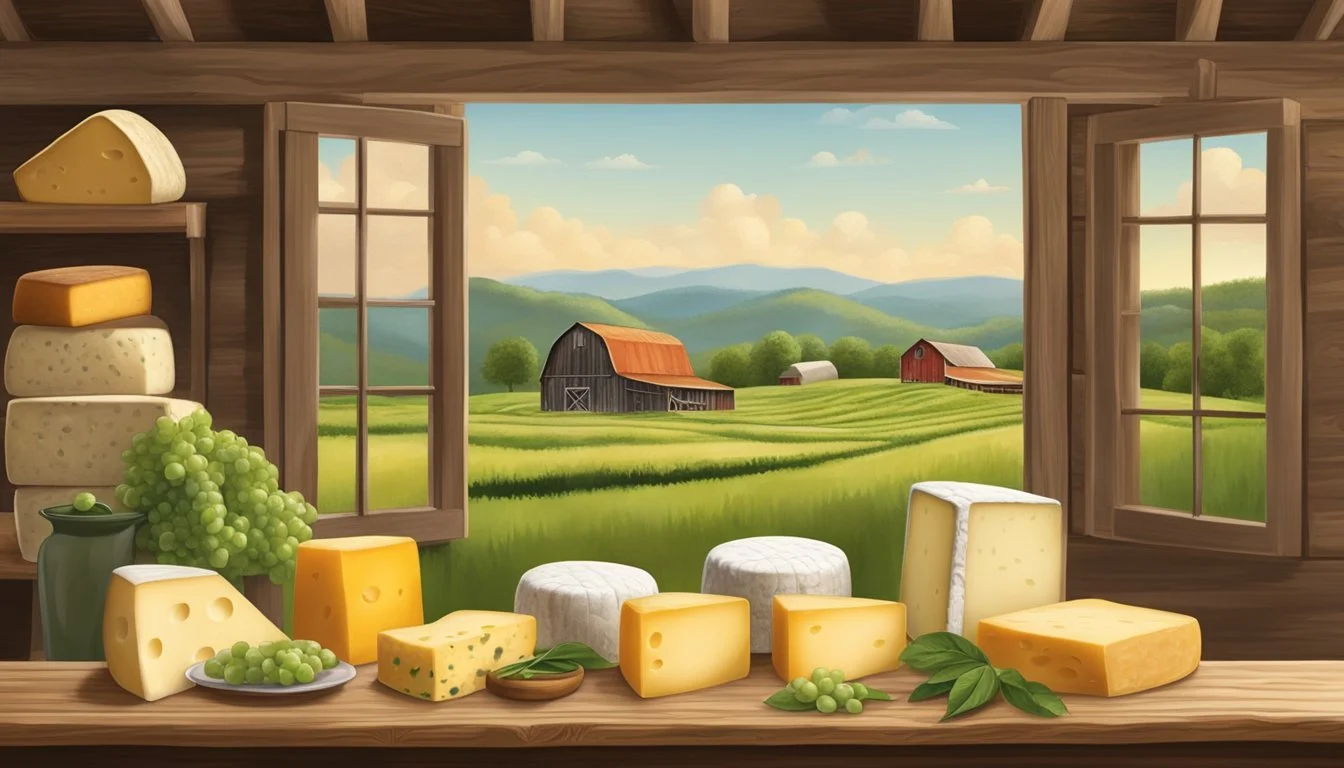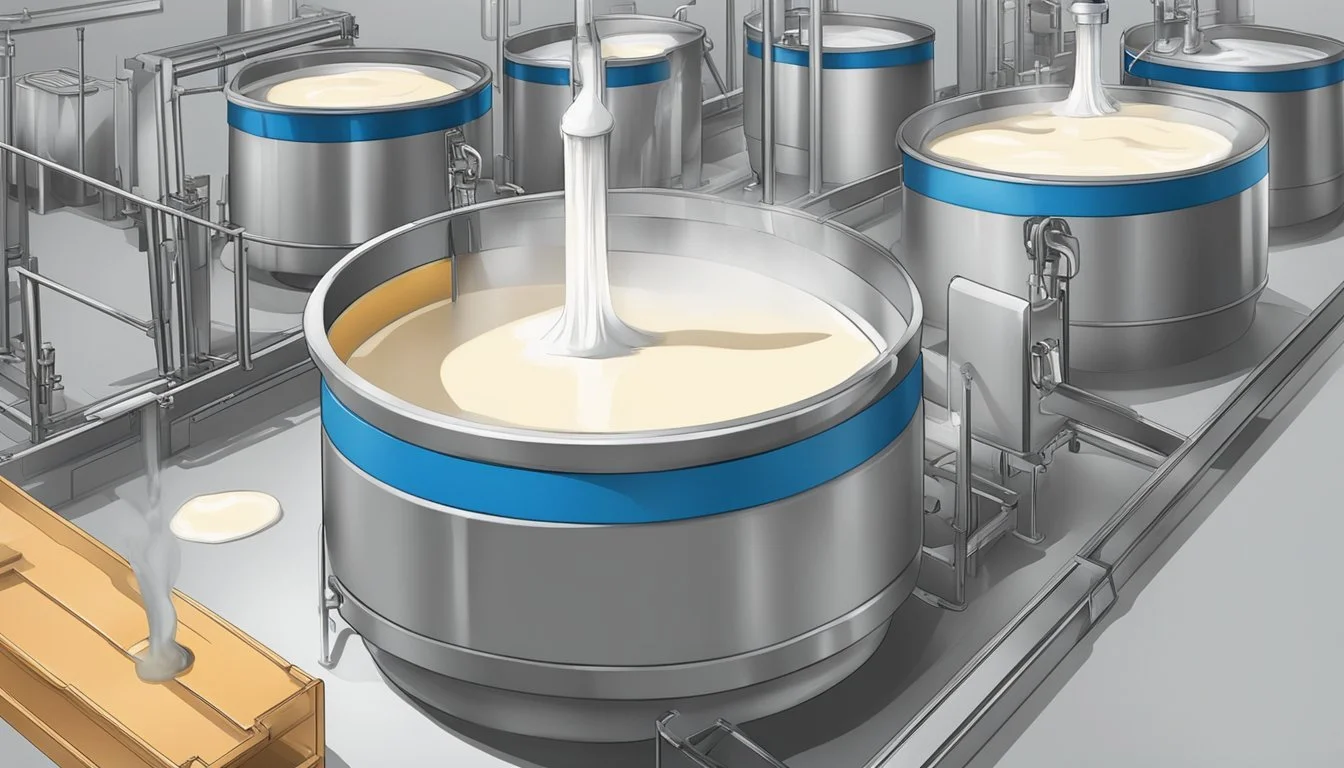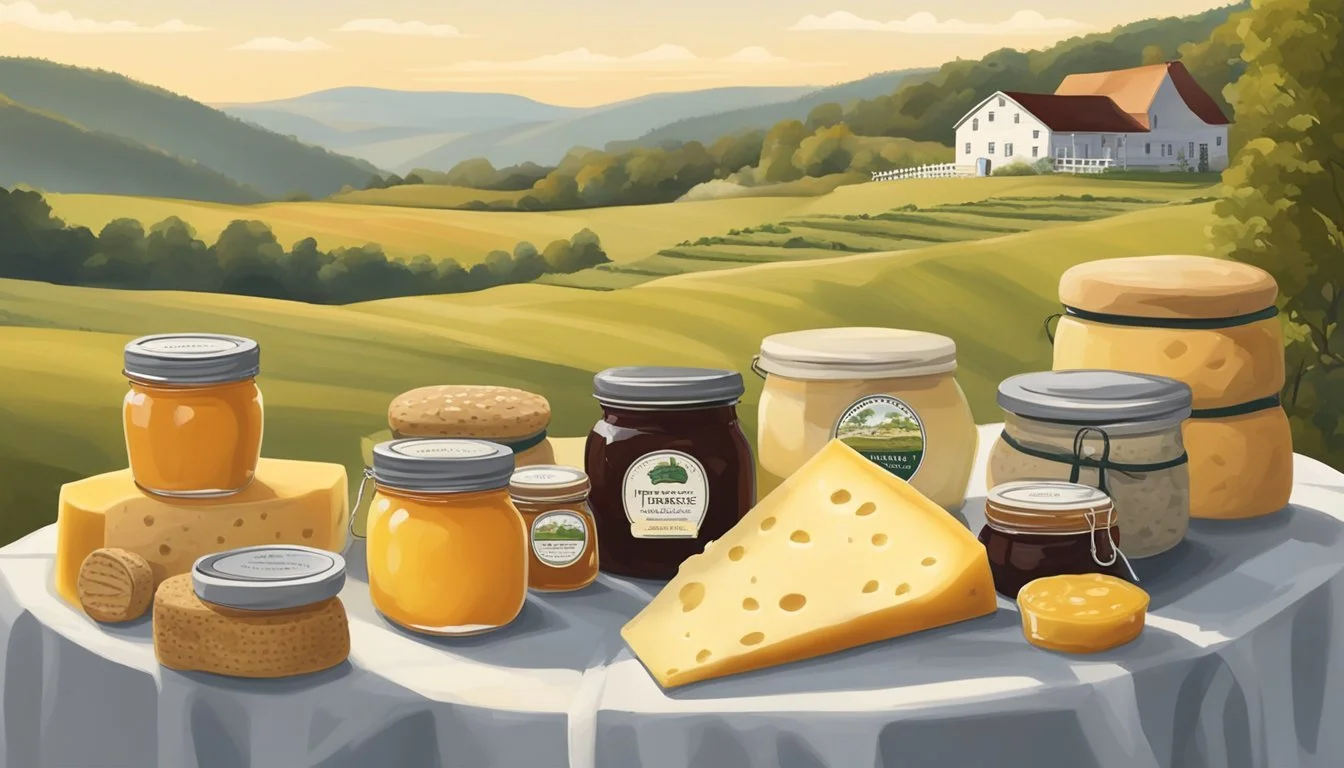Tennessee Artisan Cheese
A Guide to the State's Finest Cheesemakers
Tennessee's culinary landscape boasts a rich tapestry of flavors, and among its most cherished offerings is artisan cheese (how long does cheese last?). Recognized for its farmstead tradition, the state has a number of local creameries and dairy farms that have mastered the craft of cheese (What wine goes well with cheese?) making. Utilizing the freshest milk from cows and goats, these producers are dedicated to creating cheeses that are not only steeped in flavor but also reflect Tennessee's unique terroir.
The cheese making process in Tennessee is a blend of time-honored techniques and innovative practices. Creameries like Flowers Creamery in Giles County and Sweetwater Valley Farm are examples of destinations where farm-to-table isn't just a concept but a daily reality. Attention to animal care, dedication to natural resources, and a commitment to superior agricultural products stand at the forefront of Tennessee's cheese making ethos.
Products ranging from sharp cheddar to original creations make up the wide variety of cheeses available. The diversity is evident in each bite, whether it's derived from the rich milk of the happy cows grazing in Sequatchie Valley or the natural forages enjoyed by goats near the outskirts of Franklin. This passion for high-quality, sustainable production results in cheeses that not only grace local tables but also find their way into restaurants and shops across the United States.
History of Tennessee Artisan Cheese
Tennessee's artisan cheese history is characterized by the transformation of its dairy farms and the pivotal role of agriculture in shaping its cheese production.
Evolution of Dairy Farms in Tennessee
Tennessee's dairy farms have been a fundamental part of the state's agricultural landscape, evolving continuously over the years. In the early 20th century, dairy farming became more prominent, as exemplified by the establishment of dairy barns, like the one built on Sweetwater Valley Farm in 1917. Initially, these farms primarily produced milk for local consumption. As time progressed, some farms began to diversify and specialize, with artisan cheese becoming a valued niche product.
Key industry transitions include:
The shift from traditional to artisanal practices, adding value to typical dairy offerings.
Diversification in livestock, with farms using milk from cows, goats, and sheep to produce a variety of cheeses.
Innovation in cheese-making techniques, adapting European methods to create unique Tennessee flavors.
Impact of Agriculture on Cheese Production
The agricultural richness of Tennessee significantly contributed to its artisan cheese production. The state's varied climate and geography allowed for the cultivation of diverse feed, thereby influencing the flavor profiles of the cheese. With agriculture as its backbone, the dairy industry witnessed:
An increase in the number of artisan cheesemakers, indicating a growing interest in craft cheese.
Greater diversity in milk types used for cheesemaking, as many cheesemakers expanded beyond cow's milk to include goats and sheep.
A strong agricultural economy enabled these cheesemakers to innovate and expand their operations, producing cheeses that capture the unique terroir of Tennessee.
Types of Tennessee Artisan Cheese
Tennessee's artisan cheese landscape features an array of distinctive cheeses created with traditional methods and local flavors. From cheddar varieties that embody the southern richness to the Dutch-inspired gouda and other unique farmstead offerings, aficionados will find much to savor.
Cheddar Varieties
Tennessee artisans produce several types of Cheddar cheese, known for its sharp, pungent flavor and firm texture. Southern Sharp Cheddar is one variant that often reflects a bolder taste profile. These cheeses are typically crafted in small batches on local farms such as Flowers Creamery in Giles County, ensuring high-quality, farm-to-table dairy products.
Gouda and Other Dutch Influences
Gouda, a semi-hard cheese with a smooth texture and nutty flavor, has been embraced by Tennessee cheesemakers. This Dutch-origin cheese is often found in aged varieties, highlighting a rich, caramel-like taste that intensifies over time. Tennesseans incorporate their own twist, sometimes infusing local flavors or adopting techniques that pay homage to the Southern food tradition.
Specialty and Farmstead Cheeses
Specialty and Farmstead cheeses stand out for their unique qualities. These cheeses may include variants of "farmer's cheese" like fresh goat cheeses, herbed, firm cheeses, and those with distinctive inclusions or rinds. Kenny’s Farmhouse Cheese is an example of a Tennessee producer creating limited batches of these specialty products, often featured at regional farmers' markets. The aim is to deliver an authentic taste of the locale, with each cheese reflecting the particular characteristics of the Tennessee region where it is produced.
Key Cheese Producers in Tennessee
Tennessee is known for its lush farmlands, which nurture a variety of artisan cheese producers, each with its own unique offerings. Here, the spotlight is on a few standout farmstead cheese producers that make the state a cheese-lover's haven.
Sweetwater Valley Farm
Sweetwater Valley Farm stands out as a beacon of dairy excellence. They are a family-owned dairy farm dedicated to producing superior farmstead cheese. Emphasizing animal care and sustainable farming practices, Sweetwater Valley Farm crafts a range of cheeses celebrated for their quality and flavor.
Sequatchie Cove Creamery
Sequatchie Cove Creamery takes pride in creating artisan cheeses from the milk of its grazing cows in Sequatchie, Tennessee. Their cheeses reflect a deep commitment to environmental stewardship and agricultural heritage. With offerings available at their Trading Post and beyond, their products are meant to be savored.
Flowers Creamery
Flowers Creamery offers a local Tennessee experience with their small batch cheeses, notable for being made directly on the farm in Giles County with milk from their own Grade A Dairy. Alongside a diverse selection of cheese, like Southern Sharp Cheddar, they bottle creamline milk, providing a taste of farm to table authenticity.
Cheese Making Process
The cheese making process in Tennessee artisan cheese production involves stringent management of processing facilities and meticulous care of dairy animals. These elements contribute significantly to the high-quality cheese produced.
Processing Facility Operations
Artisan cheese processors in Tennessee maintain facilities that meet high hygiene and production standards to ensure superior cheese quality. The heart of these operations is the processing facility, a controlled environment where milk from cows is transformed into cheese. The facility is equipped with stainless steel vats and aging rooms, where cheeses are carefully crafted and matured.
Temperature, humidity, and cleanliness are paramount to prevent contamination and promote proper cheese development. Each step is monitored, from pasteurization to coagulation, curding, and pressing, to create a variety of cheeses with distinct textures and flavors.
Animal Care and Dairy Management
A crucial aspect of cheese making is the health and well-being of the cows, as it directly impacts milk quality. In Tennessee, dairy farms often raise Jersey and Holstein cattle, breeds known for their rich, creamy milk ideally suited for cheese production.
Aspect Jerseys Holsteins Milk Fat Content Higher Lower Milk Volume Lower Higher Suitability Flavorful cheeses Wide cheese variety
Dairy management practices involve regular health checks and a nutritious diet that enhances milk composition. Farms prioritize pasture access and stress-free living conditions for their animals, ensuring that they are healthy and produce the best quality milk for cheese making.
Cheese in Local Economy and Culture
Artisanal cheese production positively impacts Tennessee's local economy by offering unique products in various markets and enriching the region's culinary culture. Small-scale cheese producers connect with communities through farmers markets and local restaurants, particularly in Nashville's vibrant food scene.
Farmers Markets and Distribution
Farmers markets throughout Tennessee, such as the Main Street Farmers Market, have become crucial distribution points for locally produced farmstead cheeses. These markets provide an opportunity for cheese makers to showcase their products directly to consumers. In addition, farm stores like the Flowers Creamery in Giles County, allow customers to purchase small batch cheeses right from the source. This direct-to-consumer model not only sustains local farmers but also keeps the local economy robust by circulating money within the state.
Distribution Venues:
Local farmers markets
On-farm stores
Online platforms
Key Locations:
Nashville
Main Street Farmers Market
Flowers Creamery
The Role of Cheese in Tennessee Cuisine
Tennessee cuisine often celebrates regional flavors, with artisanal cheese adding a distinctive touch to the culinary landscape. In Nashville and beyond, restaurants integrate locally sourced cheeses into their menus, spotlighting this home-grown delicacy. The prominence of cheese can be seen in appetizers, entrees, and even desserts, where the rich flavors of Tennessee's cheeses shine through. By incorporating these products into their offerings, restaurants not only support the local cheese industry but also contribute to the state's unique food culture.
Restaurants Incorporating Artisanal Cheese:
City House in Nashville, renowned for its creativity
The Farm House, known for its commitment to local produce
Culinary Uses:
Starter plates with assorted Tennessee cheeses
Main dishes featuring local cheese varieties
The Role of the Tennessee Department of Agriculture
The Tennessee Department of Agriculture (TDA) plays a pivotal role in supporting and promoting artisan cheese production in the state. It is instrumental in helping local farmers and cheesemakers leverage the state's agricultural capabilities to produce high-quality cheese.
Support and Funding The TDA offers critical backing through funding programs, which are utilized for infrastructure improvements like developing cheese caves or purchasing equipment. These initiatives allow cheesemakers to enhance their production capabilities and maintain optimal cheese aging conditions.
Guidance and Education Additionally, the TDA provides expert guidance and educational resources. They collaborate with extensions like UT Extension to support agricultural businesses through knowledge sharing and developing new market opportunities.
Regulation and Safety Ensuring food safety and compliance with industry regulations is a fundamental responsibility of the TDA. They work closely with cheesemakers to make sure that all products meet health standards, thus ensuring consumer confidence in local cheese products.
Tennessee Department of Agriculture (TDA) Role in Artisan Cheese Production Support and Funding Infrastructure improvements, equipment grants Guidance and Education Collaborations, educational resources Regulation and Safety Compliance with health standards
The TDA's role is integral in nurturing the artisan cheese industry in Tennessee, helping it grow and maintain a reputation for fine quality and craftmanship within the state and beyond.
Community and Tourism
Tennessee’s artisan cheese industry enriches the community and attracts tourists by offering unique experiences through farm tours and local food attractions.
Farm Tours and Agritourism
Cheese enthusiasts and curious travelers find Farm Tours an engaging means to explore Tennessee's countryside. Agritourism enables visitors to witness the cheese-making process first-hand and understand the care and tradition behind it. Sweetwater Valley Farm in Philadelphia, Tennessee, welcomes guests to observe the cheese-crafting process and browse their extensive selection of farm-fresh cheeses (What wine goes well with fresh cheeses?). The state's emphasis on Agritourism ensures that these tours are not only educational but essential to the fabric of local agriculture and economies.
Cheese as an Attraction in Gatlinburg and Nashville
In Gatlinburg, cheese takes center stage as part of the town's food tourism allure. Specialty shops in the area showcase an array of cheeses, making it a destination for those seeking culinary delights. Nashville, known for its vibrant music culture, also boasts gourmet cheese attractions. Places like The Bloomy Rind offer a curated selection of both local and regional cheeses, solidifying Nashville as a gastronomic hub for discerning cheese lovers. These cheese-centric locales reinforce Tennessee's reputation for fine artisanal products, drawing visitors from across the country.
Innovation and Trends in Cheese Making
Tennessee's artisan cheese industry has witnessed significant innovation, adapting to new market demands and the shift in consumer behavior triggered by the Covid-19 pandemic.
Adopting to Change During the Covid-19 Pandemic
Artisan cheesemakers in Tennessee quickly responded to the challenges posed by the Covid-19 pandemic. With more consumers cooking at home, cheesemakers capitalized on this trend by innovating their product lines to cater to family cooking experiences. They re-evaluated traditional cheese offerings, with some, like Laura Chenel, updating their product sizes and introducing new varieties to stay aligned with market trends.
Online Sales and Marketing
The pandemic accelerated the shift to digital platforms, prompting Tennessee's cheese artisans to enhance their online presence. Online sales became a more significant focus, as face-to-face interactions dwindled. Artisan cheesemakers expanded their digital marketing efforts, reaching customers directly through their websites and social media, effectively using the online space to educate consumers about their specialty cheeses and provide convenient purchasing options.
By embracing innovation and the digital landscape, Tennessee's artisan cheesemakers have shown resilience and adaptability in the face of unprecedented challenges.
Sustainable Practices and Artisan Cheese
Artisan cheese production in Tennessee is not only a testament to culinary craftsmanship but also a commitment to sustainability. The industry prioritizes eco-friendly methods and community support.
Environmental Impact and Sustainability Efforts
Artisan cheese makers in Tennessee understand the significance of limiting their environmental footprint. They employ various sustainable practices that often include:
Energy conservation: Implementing energy-efficient technologies and reducing waste.
Water usage: Minimizing water consumption and improving wastewater treatment processes.
Local sourcing: Utilizing locally sourced milk to reduce transportation emissions.
These efforts ensure that the production of artisan cheeses does not come at the expense of the environment. Many Tennessee creameries focus on achieving full production capacity like Flowers Creamery, projected to produce 30,000 pounds of cheese per month, while maintaining environmentally responsible operations.
Supporting Local Cheese Makers
Supporting local cheese makers is central to the growth and sustainability of the artisan cheese community in Tennessee. The benefits of purchasing local include:
Strengthening local economies: Money spent on local artisan cheeses circulates within the community.
Ensuring freshness: Local cheeses are often fresher due to reduced transport times.
Preserving traditions: Patronage helps maintain traditional cheese-making practices.
Local cheese makers often face challenges such as competitive markets and fluctuating supply costs. By choosing locally made cheeses, consumers can help preserve regional flavors and bolster the state's agrarian heritage.
Consumer Information
Tennessee's artisan cheese landscape offers a diverse selection of high-quality products. The consumer's experience can be greatly enhanced by understanding how to select the best cheeses and how to pair them for optimal taste.
Selecting the Best Artisan Cheeses
When choosing artisan cheeses from Tennessee, consumers should consider the source and the cheese's characteristics. They should look for cheeses that have a clear origin, indicating a traceable path back to local farms, like those mentioned in Tennessee Lookout or by Flowers Creamery. Here are some specific selection criteria:
Origin: Ensure the cheese is locally produced in Tennessee to support local cheesemakers and ensure freshness.
Type: Decide between cow, goat, or sheep milk cheeses, noting that goat milk cheese, like those from Noble Springs Dairy, offers distinctive flavors.
Texture: Choose from soft, semi-soft, firm, or hard cheeses, based on personal texture preference.
Cheese Pairing and Usage Tips
Pairing artisan cheeses with the right accompaniments can elevate a meal or a tasting experience. Here are some pairing suggestions:
Wine Pairings: Soft cheeses pair well with sparkling or white wines, while harder cheeses can be complemented by full-bodied reds.
Food Pairings: Combine cheeses with honey, nuts (how long do nuts last?), or fruits for a well-rounded flavor profile.
Artisan cheeses from Tennessee, like those produced by Nash Cheese Co., are versatile. Usage ranges from cheese boards and appetizers to incorporation into cooked dishes. Fresh cheese curds are delightful on their own or can add a textural element to dishes. When using artisan cheeses, consumers should consider their strong flavors and use them as a focal point of the meal.
Conclusion
Tennessee's artisan cheese industry reflects resilience and dedication to tradition amidst modern-day challenges. The rise of artisanal cheese ventures, such as the one operated by Brian and Morgan Flowers, illustrates the innovative spirit driving local producers. The COVID-19 pandemic severely impacted dairy businesses, yet producers displayed remarkable adaptability. Sweetwater Valley Farm's experience, with closures affecting shop and café operations, showcases the direct impact on local cheese sales. However, it also underscores the community's support for local cheesemakers.
The artisanal cheese revolution is not just a trend but a return to heritage and craftsmanship. Tennessee's artisanal cheesemakers are custodians of this craft, offering unique flavors and textures that distinguish their products from mass-produced counterparts. They celebrate cheese's deeply rooted cultural significance, while also introducing fresh, creamy dimensions to the region's gastronomy.
Places to Find Artisanal Cheese in Tennessee:
Sweetwater Valley Farm, Philadelphia, Tenn.
Farms operated by producers like Brian and Morgan Flowers.
In the Upper South, each artisanal cheese stop is a testament to the richness of America's cheesemaking heritage. As one navigates the flavors and stories of Tennessee's artisan cheese, they engage with a legacy that is sustained through each slice of carefully crafted cheese. It's a journey of taste, tradition, and the tireless pursuit of quality that continues to shape the state's food culture.













